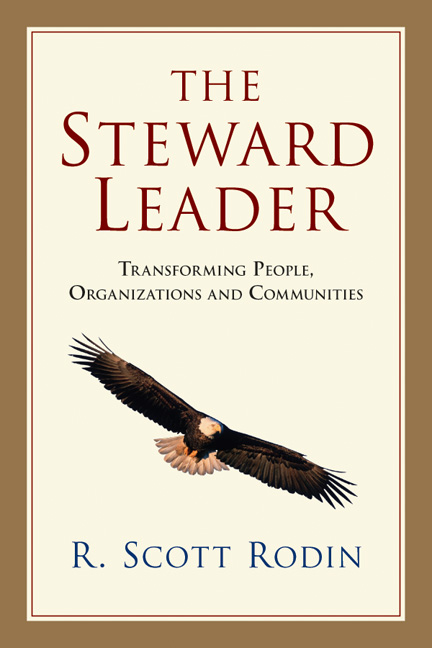Scott Rodin: The Steward Leader
 R. Scott Rodin, The Steward Leader: Transforming People, Organizations and Communities (Downers Grove: InterVarsity Press, 2010), 197 pages, ISBN 9780830838783.
R. Scott Rodin, The Steward Leader: Transforming People, Organizations and Communities (Downers Grove: InterVarsity Press, 2010), 197 pages, ISBN 9780830838783.
The Steward Leader begins by telling the reader that the book is not about the “how” of leadership but about the “who”—who God is and who we are as stewards in God’s kingdom. Author Scott Rodin calls the book an invitation to a journey in which we learn about God, ourselves, and our identity and purpose in life. Christians are called first to be stewards, and some of us are called to be steward leaders. Rodin describes four levels of transformation represented by our relationships to God, ourselves, our neighbors, and the creation. By living a life of transformation we cease to set ourselves up as owners of things, positions, and people, and become stewards of all that God has given us; we cease to feel obligated to perform for God and others, and are liberated to serve out of joyful obedience. Indeed, joyful obedience is the heart of the steward leader, and this theme is carried throughout the book from cover to cover.
The book contains three sections plus an introduction and conclusion. The first section is a kind of prologue to the remainder of the book, in that it introduces the idea that we are called to be steward leaders of “no reputation” based on the passage from Phil. 2:7. That is, as steward leaders we are to be like Jesus, who made himself of no reputation and took upon the form of a servant. Rodin lays out five areas in which leaders must position themselves in order to take on the mantel of stewardship. The first area, for example, distinguishes between anointing and appointment. Frequently, leaders are appointed to an office, and then they are anointed for that position by those who appointed them. However, Rodin argues that biblical accounts suggest the reverse order: God anoints a person who is then appointed to a leadership position. An appointment to leadership does not require humility or service toward others, but an anointing to leadership requires that leaders submit everything to God. Rodin stresses that “submission is the disposition of the heart of the steward leader.”[i] The remaining areas concern this notion of submission, servanthood, and stewardship. Rodin argues that our sole calling is to be like Jesus and him alone. As we respond faithfully to God’s calling and humble ourselves we will be transformed into his likeness.
The second section deals with three foundations upon which we lead as stewards in God’s kingdom. The first foundation recognizes that we are made in the image of a triune God, and we were created to bear this image in community with others who bear his image. The implications for this assertion serve as the definition of what a godly steward is. Rodin writes,
As God’s people, we are called to reflect the image of our Creator God through whole, redeemed relationships at four levels—with God, with our self, with our neighbor and with creation—bringing glory to God and practicing in each the ongoing work of the faithful steward.[ii]
Rodin then describes each part of the definition as a three-part story with four levels, which center explicitly on relationships. The author explains the Christian’s purpose through the lenses of these relationships. God has called us “to respond to Christ’s redemptive work at all four levels.”[iii] We must take responsibility for our relationships, and this responsibility-taking Rodin sees as an obedient response to God’s call to be a godly steward.
Rodin lays two other foundations for the development of the steward leader. Those foundations are stewarding in freedom and characteristics that steward leaders have. “Obedient and joyful response . . . is the only requirement of the steward leader.”[iv] This new paradigm for leading requires freedom over ownership, Rodin states. Indeed, Rodin frequently juxtaposes the ideas of stewardship with ownership. Stewardship is what Christians are called to; only when we are stewards are we truly free to lead. Ownership, on the other hand, is what we are in bondage to when we seek to control our relationships, when we use others as a means to achieve our purposes, and when we place more value in what we own than in what God created. Rodin argues that steward leaders are not stewards in order to be effective; rather, their actions are grounded in obedience to God. It is the joyful and obedient response to God first that determines whether a steward leader will be effective. Steward leaders are consistent in their witness to God’s purposes for them and their organizations. Rodin warns that leaders lose their effectiveness when they model inconsistent behavior and allow their organizations to do the same.
Category: Ministry, Summer 2015


